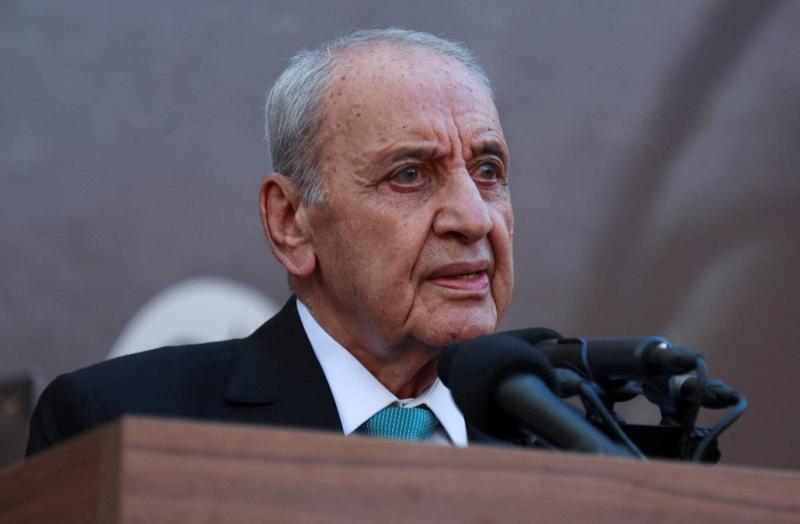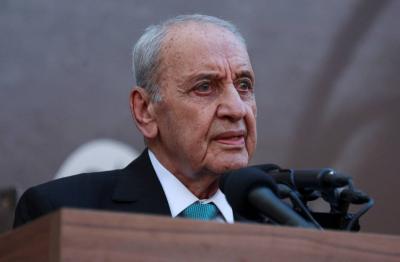Tomorrow, the presidential election remains a significant and necessary deadline. Among the international officials who visited Beirut in recent weeks, none have thought to inquire about this matter. Their discussions only revolve around Resolution 1701 and the southern front. When President Nabih Berri is asked whether he intends to make any moves to revive the presidential election, he responds negatively, adding that no party "wants a solution from the inside but rather from the outside." When asked if the neglect of the presidential election will continue indefinitely, he responds that there is "only one candidate" so far, which is the head of the Marada Movement, Suleiman Franjieh: "The others either no longer exist or do not wish to run." However, he adds, "Now we have a candidate, Suleiman Franjieh. If they agree to his candidacy, I invite them to a session, and let them go."
Berri reflects, according to Al-Akhbar newspaper, without wanting to elaborate on the stalled issue, the ongoing stalemate since the twelfth session on June 14. Over the past year, only two sessions have been held, the first on January 19. Before that, during the vacancy year, Parliament convened for ten unproductive sessions from the eve of President Michel Aoun's end on October 31, 2022, until the end of that year. Since the June 14 session, no one has talked about the fate of the election. The issue still revolves around Franjieh's candidacy more than the necessity of electing a President as a constitutional obligation. The stance towards the person, by those who support him and those who oppose him, has a greater impact than exiting the status of vacancy. More than one candidate has emerged during this period, circling around finding a solution to prevent Franjieh's election at any cost for those who oppose him, without his supporters being able to impose his election.
A retrospective review of the reality over the past few months shows that Franjieh's withdrawal from the race is viewed by some as the shortest path to electing a President, while others see it as an additional reason for the continuation of the vacancy, insisting on their right to have their candidate and rejecting what others oppose.
Since the June 14 session, there are some data, some of which are old and still persist, and some are recent but are aging over time:
1. Franjieh remains the sole candidate of the Shiite duo, first and foremost. His continued candidacy is reinforced by his assertion that he has no intention of withdrawing or abandoning his candidacy. He derives his strength from having, at least according to the numbers from the last session six months ago, 51 votes that cannot be diminished, backed by the Shiite duo and their Sunni and Christian allies. This is not available to any other candidate. Although his opponent at that time, former Minister Jihad Azour, received 59 votes, the bloc of these votes is fluid and fluctuating because it arises from the intersection of the Free Patriotic Movement with opposing Christian parties and blocs, up to MP Taymour Jumblatt's bloc. What those votes signify is that they are against Franjieh more than they are a boost for Azour.
2. Discussion is expanding regarding ways to find a breakthrough to exit the vacancy predicament and, consequently, the Franjieh knot, leading to the proposal of a "third candidate." It is known that the five countries concerned with Lebanon support this idea, but they do not agree on who possesses the qualifications for it. The French have abandoned Franjieh, and the Americans and Saudis stand against him, while the Qataris have proposed a candidate outside the circulating names, who is acting General Director of General Security, Major General Elias Bechir. Since then, no progress has been made regarding this new proposal, which in turn has also become a hostage to the problem due to the Shiite duo's continued support for Franjieh, who, in turn, is unwilling to vacate his position for any third candidate. The problem is no longer about a third name, regardless of who it may be, but rather about securing the mandatory constitutional quorum for holding his election session (at least 86 MPs). At that point, his election in a second or third round becomes a secondary detail. The first to need this described quorum is the MPs of the Shiite duo (26+1).
3. Since the onset of the vacancy, and often before it, as is customary in every similar election, the name of the army commander is one of the most frequently mentioned names. This remained ordinary until the date of the parliamentary session on December 15 when an extension of his retirement age was made so that he could remain in his position and continue throughout this current year until a President is elected — a major candidate. However, it has not yet been disclosed, directly or indirectly, the bloc that the commander enjoys support from without wavering. While Franjieh claims that he is a candidate, General Joseph Aoun cannot declare the same. And while the head of the Marada Movement is reassured of at least 51 votes by his side, only a few scattered individuals have publicly declared their support for the army commander.
The extent of clarity regarding his position and role, Aoun's candidacy — not his running — is surrounded by a cloud of ambiguity concerning its outcome among the main player factions: Among them are those who have not stated at all that he is at least an opportunity and not their candidate in light of the candidate supported by the Shiite duo, and those who oppose his election for reasons that appear principled but are personal at their core, like Head of the Free Patriotic Movement MP Gebran Bassil. There are those who want him to be a continuous competitor to Franjieh to bring both down rather than to be an elected President, like the Lebanese Forces party. It is unclear whether there is old or newer goodwill between the commander and the party, and it is unknown — to those who knew Aoun closely — that he would be of the types who yield to suggestions. Among them is the Jumblatt bloc opposing Franjieh's election, but it progresses towards electing a President emerging from a compromise, nothing more. Lastly, the Sunni MPs are waiting for the password from Riyadh. But among these and those — and this is the ambiguous part — there is another team working in the shadows, which is the team of the army commander, the most urgent officers, who see him as the candidate of the five capable countries that could ultimately elevate him to the highest office. Their belief is sourced from that these five countries, either collectively or separately, have experience in bringing army commanders to the presidency: In 1958, Major General Fouad Chehab was a candidate of the Americans and Egyptians; then, half a century later, in 2008, Major General Michel Suleiman was their candidate, with varying interest from Americans, Egyptians, French, Saudis, and finally Qataris.




